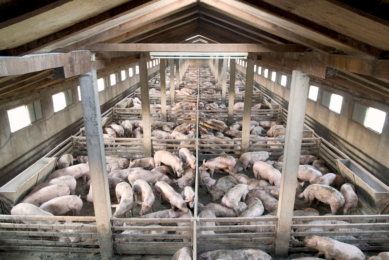Covid-19: US pork industry may see profits mid-2021

As the US and Canadian pig industries are gradually catching up with the processing backlog, a picture emerges what life might be like for swine producers in the long run. For US producers, profitability might perhaps be possible by mid- to late 2021. These are the main Covid-19 developments in North America this week.
Since the pandemic took hold, pork packing plant capacity in North America has been severely reduced through worker infections, temporary closures and new safety measures. The US National Pork Producers Council (NPPC) estimated that up to 10 million hogs may need to be euthanised this year. However, CEO of the National Pork Board Bill Even stated this week that “as we enter into June, we’re running at about 18% or so idle”, which he considers “a vast improvement” on the 45% idling of national hog slaughter capacity in early May.
Pork: profitability uncertainty
It is hard for anyone to predict how much profitability will be possible in the near and long-term future in the North American pork industry. To mitigate negative impact, the NPPC recently raised its level of pressure on the US Senate “to expeditiously adopt livestock agriculture provisions included in Covid-relief legislation recently passed by the US House of Representatives.”
Good domestic and export demand
Scott Brown, an agricultural economist at the University of Missouri, believes that pork production in the US will slowly grow this year due to good domestic and export demand, he told Farm Journal’s Pork. “If the domestic economy can find some solid footing in 2021,” he said, “then some modest profitability could occur by mid-to-late 2021.”
Canada may rely on pork imports
In Canada, Darcy Fitzgerald, executive director of Alberta Pork, recently noted again that the financial losses of selling pigs for less than the cost to raise them may cause some Canadian pork farmers to stop producing pigs. This may lead Canada to rely to pork imports, said Fitzgerald, and lose its place as 3rd-largest pork producer in the world.
Tyson Foods pork plant closure
That doesn’t mean, however, that all Covid-19 related processing backlogs are over. Tyson Foods last week temporarily closed its Storm Lake pork plant in Iowa due high numbers of Covid-19 infections among the workers. A deep cleaning was conducted while the plant was closed.
On June 2, Tyson released results of facility-wide testing for Covid-19 at the plant where about one-quarter tested positive and “more than 75% did not show any symptoms”. Tyson resumed limited production at the plant on June 3. One day prior, Iowa state health officials declared that a new system to alert Iowans about Covid-19 outbreaks at meat processing plants is on the way.

Covid-19 Up-date
What impact is the pandemic having on the global pig sector and how are they dealing with it.
LA: Unions complain at meatpacking plant
On May 28 in Los Angeles, the union at a meatpacking plant near Los Angeles where about 10% of workers have contracted Covid-19 “called for the plant’s immediate closure, saying measures to control the outbreak were not working”.
The United Food and Commercial Workers International Union has called for the industry and federal government to do more to protect meat plant workers; infections among them now exceed 3,000 on a national scale, with 44 deaths.
New market for small packing plants?
Last week, Pig Progress reported that the processing backlog exists at both large and small packing plants in the US and Canada, while various programmes in the US have started up to get pork to the needy. There are new reports that small slaughterhouses in both countries continue to be overbooked, but there are also new developments which may lead to both greater market reach and capacity.
For example, momentum is growing in the US for the passage of legislation that would lift restrictions and allow over 1,000 small processing plants to supply meat to restaurants, schools and similar outlets. Gavin Wax of the Foundation for Economic Education explained that “the bill has been sitting in the House and the Senate for nearly a year,” and “could be fast-tracked… if the political will is there.”

How to deal with overstocking in pens?
Backlog reduced on Sunday in Quebec, Canada
On Sunday, over 800 workers at 3 pork processing plants owned by Olymel worked voluntary overtime shifts to address the backlog in that province that now exceeds 100,000. That day, Olymel donated CAN$ 2 (US$ 1.48) for each hog slaughtered to charity and provided more than 2,000 meals for the workers.
Meanwhile in the province of Saskatchewan, a local newspaper reported that Donald’s Fine Foods, the owner of Thunder Creek Pork in a community called Moose Jaw, has purchased a nearby beef packing plant that has been closed for a decade, which may be retrofitted to process pigs.
In British Columbia, a community group is funding a study on the feasibility for a small meat processing plant on Vancouver Island where there are numerous livestock farms but no abattoir.
Euthanasia methods scutinised
Iowa Select Farms made the news when 3 activists were arrested who had chained themselves to a fence outside an Iowa facility where euthanasia had been performed. The Des Moines Register wrote how the activists had been involved with secretly videotaping the euthanasia, which would include the shutting down ventilation and increasing heat and temperature.
‘Few options’
In a general statement from May 20, Iowa Select Farms explained having to euthanise pigs – and stated that vets and production well-being professionals were overseeing the process to make sure it happens in line with AASV and AVMA recommendations. In the press release the company said: “This is sad and difficult work. Our team members grieve as they implement our plan. Yet, given the devastating effects of Covid-19 on those who work in food supply, there are few options.”











